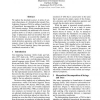Free Online Productivity Tools
i2Speak
i2Symbol
i2OCR
iTex2Img
iWeb2Print
iWeb2Shot
i2Type
iPdf2Split
iPdf2Merge
i2Bopomofo
i2Arabic
i2Style
i2Image
i2PDF
iLatex2Rtf
Sci2ools
ACL
2004
2004
Wrapping of Trees
We explore the descriptive power, in terms of syntactic phenomena, of a formalism that extends TreeAdjoining Grammar (TAG) by adding a fourth level of hierarchical decomposition to the three levels TAG already employs. While extending the descriptive power minimally, the additional level of decomposition allows us to obtain a uniform account of a range of phenomena that has heretofore been difficult to encompass, an account that employs unitary elementary structures and eschews synchronized derivation operations, and which is, in many respects, closer to the spirit of the intuitions underlying TAG-based linguistic theory than previously considered extensions to TAG.
Related Content
| Added | 30 Oct 2010 |
| Updated | 30 Oct 2010 |
| Type | Conference |
| Year | 2004 |
| Where | ACL |
| Authors | James Rogers |
Comments (0)

